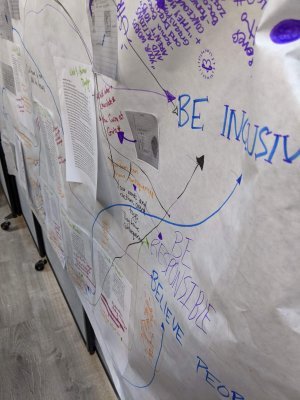
“Here at Makom Community, we talk a lot about how to manage conflict. And I know if I need to step away and take time out, my friends will understand.”
It’s amazing to see a group of preteens form as tight of a community as our BMitzvah cohort has. When I met them at the beginning of the year, I noticed immediately how much they support each other. What do we promise each other when we already have built a community? How do we take our community one step further?
We turned to the Tower of Babel text for answers. It sent us in as many different directions as the number of languages created in the story, towards conversations about Janusz Korczak’s childrens’ rights, nonbinary Hebrew, and even creating new words we felt like English was lacking!
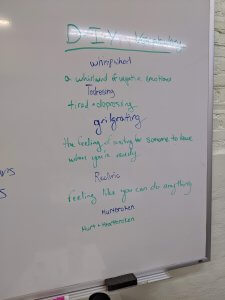
Our conversations always led back to Makom Community and how we can better understand each other. We grouped our findings around Makom Community’s four base values: Be Kind, Be Helpful, Be Inclusive, and Believe Each Other. We fashioned our brit as four tallitot with tzitzit that we made ourselves. Each tallis has a few well-chosen words on it as to how to act on one of these four values. In this blog post, I’m going to trace some of these ideas back to their source.
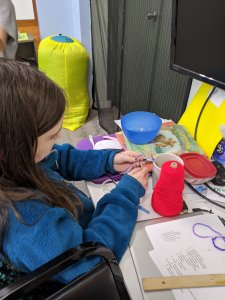
Making tzitzit for our brit.
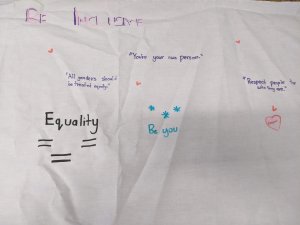
“Boys and girls should be treated equally, who thinks this should be on our brit?” A few thumbs up (yes) and some thumbs sideways (maybe), go up.
“What’s your hesitation?”
“I don’t like the language. I think it should say ‘all genders.’ What about people who aren’t girls or boys.”
“How do we feel about ‘All genders should be treated equally?’” All thumbs up!
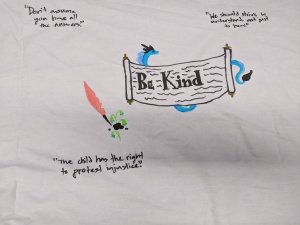
“We should strive to understand, not just to hear.”
Everyone makes mistakes, even God. When reading the Tower of Babel story, we noticed that God jumps to conclusions about why the humans were building the tower. This reminded us to strive not just to hear each other, but to make sure that we understand each other.
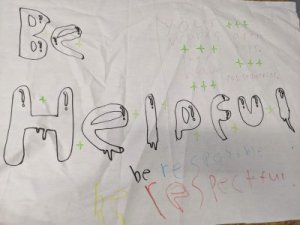
“Your words aren’t toys. They have consequences.”
In our deep dive into the Tower of Babel, we looked at Rashi’s commentary on the verses. Rashi gives three explanations for what דברים אחדים might mean. One is that the people building the tower spoke with “sharp words.” We experimented with how words can be sharp by reading a basic script with different emotions. Even the same words can have very different impacts with different intentions. From this, we discovered that our words and actions are not things to be taken lightly. They’re not toys.
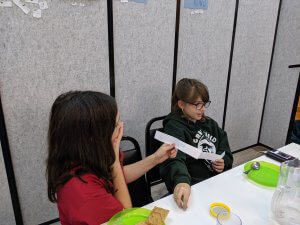
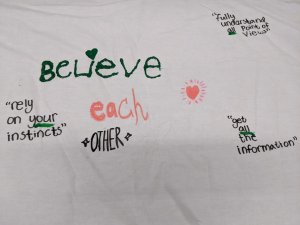
“Fully understand all points of view.”
When do you have enough information to make a decision? It’s one thing to say we should understand each other but another to go past our own emotions to fully understand someone else, especially when we’re mad at them! A lot of strategies came out of this question:
Take time. Separate if you’re angry and come back when you can actually talk.
Get someone else, like a mediator, who isn’t part of the conflict to listen and help make a solution.
Our compassion leads us to try to understand each other. One of my favorite moments in making our brit was a spontaneous discussion about what happens when your parents punish a younger sibling for something they did wrong. Those in our BMitzvah cohort with younger siblings expressed a lot of conflicted feelings; they had deep compassion for the pain of their younger sibs and knew that they needed to learn a valuable lesson. We talked about how to show each other that we care and love each other, even when the other person has done something wrong.
“Rely on your instincts.”
Our BMitzvah cohort has great instincts, developed by time in loving community and by deep thinking. I can’t wait to see where those instincts lead us.
